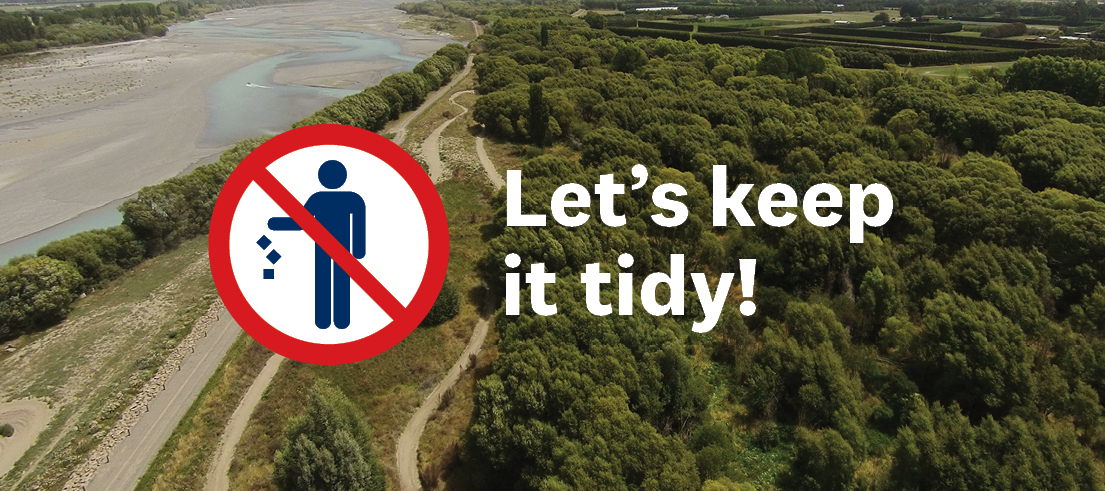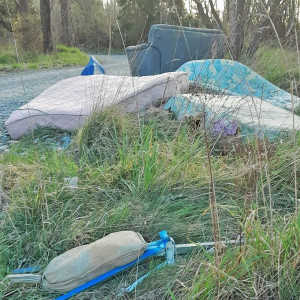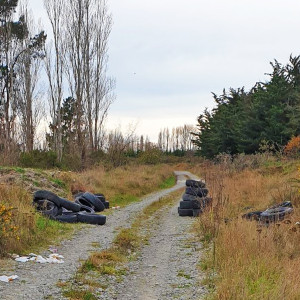
Rubbish from reckless spring cleaning puts a damper on Waimakariri
Spring is upon us. It's a time of year when we see the first signs of some of the best things that the natural environment can offer us. Sadly, it's also a time when we see an increase in something that harms our environment - illegal rubbish dumping in our parks and rivers.

Dumped rubbish along the Eyre River
Rubbish dumping is a large and costly problem, so we're asking people to do the right thing and take the rubbish from their spring cleaning to the dump or recycling stations.
Our riverbeds and parks are no place for this waste. Yet council staff regularly respond to reports of dumped rubbish right across Canterbury, with contractors needing to be hired to clean up the mess.
All of this comes at a cost to ratepayers.
In some cases, the rubbish might be small piles of domestic waste. In others, such as when up to 1,000 tyres were dumped in the Waikirikiri/Selwyn riverbed, it means a large, time-consuming and costly clean-up.
"You wouldn't believe the things people dump," said Northern Zone Delivery Lead Marco Cataloni.
"Cars, mattresses, couches, whiteware, tyres, books, and food waste. Offal as well. It’s very irresponsible."

Another pile of rubbish - this time tyres - along the Eyre River
Waimakariri sees significant cases
During the last financial year, Waimakariri received 149 reported rubbish dumping incidents.
"Our Waimakariri incident response team received more than half of the Canterbury region's total," Cataloni said.
"This doesn't include the rubbish that is regularly collected by our parks and rivers team every day, while going about their work, or the time community members freely give to collecting rubbish.
"The high numbers of dumped waste show that we have an active and vigilant community that lets us know where rubbish is dumped. But it also shows that we have some of the worst offenders for rubbish dumping in the region."
Rubbish in rivers a risk
Rubbish dumped in our parks and rivers poses a significant risk to the natural environment and impacts the life-giving attributes of these precious awa (waterways).
"Chemical leaching, oils and burnt plastics are all key concerns with dumped waste. Rubbish harms water quality and native habitats, and hinders flood protection measures," Cataloni said.
Dumped rubbish also undermines the wonderful mahi (work) that many in the community are doing.
"Many individuals, landowners and community groups work tirelessly to restore and enhance mahinga kai, biodiversity and water quality across the region.
"It's a shame that the shabby behaviour of a few members of the community can undermine the great work of others," he said.
Dealing with waste a waste of resource
Our regional parks and rivers team often pick up dumped rubbish as they carry out fieldwork.
Taking staff away from their important role in maintaining and enhancing these areas for all is a waste of resources.
"Let our staff get on with the positive stuff, like restoring native areas, providing advice to landowners and community groups, and planning recreational areas in our parks," Cataloni said.
Seen it? Report it!
Cataloni encourages people to contact Environment Canterbury if they see something suspicious.
"The community is our eyes and ears. Using Snap, Send, Solve or calling our incident response team is one of the easiest, most effective ways to let us know where and what rubbish is being dumped.
"If you're able to send exact information about the location, and attach images, it means we're able to follow it up more efficiently," he said.
Reporting rubbish in riverbeds
If you see suspicious activity or rubbish being dumped in a riverbed or our regional parks, please note the details of the vehicle and location, and report it to our Incident Reporting Line on 0800 765 588 or by using the Snap Send Solve app or online reporting tool.
Reporting rubbish elsewhere
If you see dumped rubbish in a public park, please send your local council a photo from your cellphone using the Snap Send Solve app or call their customer services number.
Where should waste go?
Most local councils provide kerbside collection services for organics, recycling or rubbish, in selected areas of the district, paid for by local council rates.
If you don't live in an area where kerbside collection is offered, there will be a resource recovery park or transfer station where you can take your recycling and waste. There is usually a cost to take waste to these locations, but it sure beats the risk of a $750 fine for dumping rubbish in our regional parks.
Private collection companies are also available. A simple google will help you find one that services your area.
